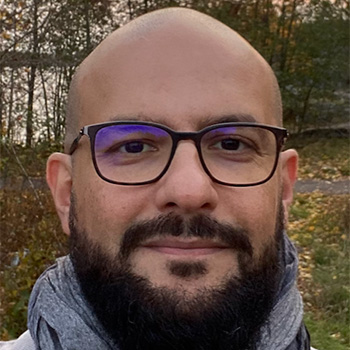The use of immersive media (e.g., point clouds, light fields, meshes, etc) enables mixing the physical and virtual world to create an unprecedented experience for applications like AR/VR (augmented/virtual reality), Digital Twin and the Metaverse. To make these applications feasible over current and future communication networks and maximize user experience, efficient compression of immersive media is essential. This ICME workshop on Immersive Media Compression aims at bringing forward recent advances related to compression technologies for light fields, point clouds, meshes, etc. The goal is to gather researchers with diverse and interdisciplinary backgrounds to cover a variety of aspects related to compression (e.g., format, processing, quality measurement, optimization, etc.), to efficiently develop Immersive Media Compression systems and technologies. Topics of interest include immersive video representations with up to 6 degrees of freedom (omnidirectional, plenoptic, volumetric), subjective and objective quality assessment, conventional and learning-based coding methods, streaming solutions and energy-efficient processing for immersive video.
https://imc-icme2023.github.io/
1 April 2023
Zhan Ma
Nanjing University, China
Giuseppe Valenzise
CNRS, France
Dandan Ding
Hangzhou Normal University, China
Faranak Tohidi
Charles Sturt University, Australia
Pan Gao
Nanjing University of Aeronautics and Astronautics, China
Danillo Graziosi
Sony, USA
Recent years have witnessed the fast developments of immersive and interactive multimedia, including multiview/stereo 3D, panorama, light field, point cloud, mesh, etc. The typical application scenarios usually involve human observation or machine judgement to provide better visual experience or machine vision performances. Due to the unique differences of these emerging visual signals, the perception rules and characteristics in diverse specific applications require further investigations to more accurately model and improve the perception quality and utilities. Thus, researchers have become interested to construct high quality databases, develop quality evaluation metrics, and devise efficient compression and enhancement methods for perceptual quality improvements. Moreover, the international standardization organizations (e.g., MPEG and JPEG, etc.) have also recently invested many efforts to develop effective solutions for better applications of these new immersive and interactive visual media data. Besides, the well-devised software and hardware implementation systems for efficient communication and processing, as well as the applications of these technologies for better perception utilities are also urgently demanded. This workshop is intended to provide a forum for researchers and engineers to present their latest innovations and share their experiences on all aspects of algorithms and system implementations for multidimensional perception modeling and optimization in the communication and processing of new immersive and interactive multimedia, as well as the advancements in the standardization activities.
https://icme2023-pcpi2m-workshop.github.io/
23 March 2023
Wei Gao
Peking University, China
Siwei Ma
Peking University, China
Shiqi Wang
City University of Hong Kong, Hong Kong
Mai Xu
Beihang University, China
Hui Yuan
Shandong University, China
Tiesong Zhao
Fuzhou University, China
Multimedia signals – speech, audio, images, video, point clouds, light fields, … – have traditionally been acquired, processed, and compressed for human use. However, it is estimated that in the near future, the majority of Internet connections will be machine-to-machine (M2M). So, increasingly, the data communicated across networks is primarily intended for automated machine analysis. Applications include remote monitoring, surveillance, and diagnostics, autonomous driving and navigation, smart homes/buildings/neighborhoods/cities, and so on. This necessitates rethinking of traditional compression and pre-/post-processing methods to facilitate efficient machine-based analysis of multimedia signals. As a result, standardization efforts such as MPEG VCM (Video Coding for Machines) and JPEG AI have been launched. Both the theory and early design examples have shown that significant bit savings for a given inference accuracy are possible compared to traditional human-oriented coding approaches. However, a number of open issues remain. These include a thorough understanding of the tradeoffs involved in coding for machines, coding for multiple machine tasks, as well as combined human-machine use, model architectures, software and hardware optimization, error resilience, privacy, security, and others. The First IEEE Workshop on Coding for Machines is intended to bring together researchers from academia, industry, and government who are working on related problems, provide a snapshot of the current research and standardization efforts in the area, and generate ideas for future work.
Duration: Full Day
30 March 2023
Ying Liu
Santa Clara University, USA
Heyming Sun
Waseda University, Japan
Hyomin Choi
InterDigital, USA
Fengqing Maggie Zhu
Purdue University, USA
Ivan V. Bajić
Simon Fraser University, Canada
With the rapid growth of video surveillance applications and services, the amount of surveillance videos has become extremely "big" which makes human monitoring tedious and difficult. At the same time, new issues concerning privacy and security have also arised. Therefore, there exists a huge demand for smart and secure surveillance techniques which can perform monitoring in an automatic way. Firstly, the huge abundance of video surveillance data in storage gives rise to the importance of video analysis tasks such as event detection, action recognition, video summarization including person re-identification and anomaly detection. Secondly, with the rich abundance of semantics and the multimodality of data extracted from surveillance videos, it is now essential for the community to tackle new challenges, such as efficient multimodal data processing and compression. Thirdly, with the rapid shift from static singular processing to dynamic collaborative computing, it is now vital to consider distributed and multi-camera video processing on edge- and cloud-based cameras, and at the same time, offering privacy-preserving considerations to safeguard the data. This workshop aims challenge the multimedia community towards extending existing approaches or exploring brave and new ideas.
30 March 2023
John See
Heriot Watt University, Malaysia
Minxian Li
Nanjing university of Science and Technology, China
Saimunar Rahman
CSIRO, Australia
The goal of this workshop is to advance the field of research on the techniques of AI for sports data, develop more techniques to accurately evaluate and organize the data, and further strengthen the synergy between sports and science. Papers about machine learning, vision processing, and data sciences in sports and new forms of sports technologies are encouraged for submission.
https://ai-sports23.github.io/
13 April 2023
Huang-Chia Shih
Yuan Ze University, Taiwan
Takahiro Ogawa
Hokkaido University, Japan
Jenq-Neng Hwang
University of Washington, USA
Rainer Lienhart
Augsburg University, Germany
Thomas B. Moeslund
Aalborg University, Denmark
3D multimedia analytics is one of the fundamental problems in multimedia understanding. Different from 3D vision, 3D multimedia analytics mainly research on how to fuse the 3D content with other media. It is a very challenging problem that involves multiple tasks such as human 3D mesh recovery and analysis, 3D shapes and scenes generation from real-world data, 3D virtual talking head, 3D multimedia classification and retrieval, 3D semantic segmentation, 3D object detection and tracking, 3D multimedia scene understanding, and so on. Therefore, the purpose of this workshop is to: 1) bring together the state-of-the-art research on 3D multimedia analysis; 2) call for a coordinated effort to understand the opportunities and challenges emerging in 3D multimedia analysis; 3) identify key tasks and evaluate the state-of-the-art methods; 4) showcase innovative methodologies and ideas; 5) introduce interesting real-world 3D multimedia analysis systems or applications; and 6) propose new real-world or simulated datasets and discuss future directions. We solicit original contributions in all fields of 3D multimedia analysis that explore the multi-modality data to generate the strong 3D data representation. We believe this workshop will offer a timely collection of research updates to benefit researchers and practitioners in the broad multimedia communities.
Duration: Half Day
https://3dmm-icme2023.github.io/
1 April 2023
Shan An
JD Health International Inc., Beijing, China
An-An Liu
Tianjin University, Tianjin, China
Kun Liu, JD Logistics
Inc., Beijing, China
Guoxin Wang
Zhejiang University, Hangzhou, China
Wu Liu
JD Explore Academy, Beijing, China
Antonios Gasteratos
Democritus University of Thrace, Greece
Accurate analysis of human movement is critical for tasks such as understanding body loading, identifying techniques for enhancing performance, and analysing activities. Computer vision based systems allow for non-invasive, unencumbered human movement analysis, and combined with advances in hardware capability enable the tracking and monitoring of people in the field, outside the strict confines of a laboratory. Athletes, patients and workers can be observed in their natural environment, leading to a more realistic understanding of their movements. Application domains vary from sports, health (walking gait) and well-being (injury detection) to entertainment (dancing analysis) and broadcasting (automatic annotation).
Dependable detection and tracking of human body parts, accurate body posture estimation, and analysis of changing facial expressions and hand gestures are examples of demanding tasks. The goal of this workshop is to provide a forum for researchers and professionals to share recent advances in employing computer vision technology for human movement analysis, and identify future directions.
Duration: Half Day
https://sites.google.com/vuemotion.com/icme2023-hma-workshop
30 March 2023
Dr. Amit Gupta
VueMotion
Dr. Jeroen Vendrig
ProofTec
Dr. Vinay Kaushik
VueMotion
AIART 2023 aims to bring forward cutting-edge technologies and most recent advances in the area of AI art in terms of enabling creation, analysis, understanding, and rendering technologies. The theme topic of AIART 2023 will be AI for Creative Synergy. We plan to invite 5 keynote speakers to present their insightful perspectives on AI art.
Duration: Half Day
9 April 2023
Luntian Mou
Beijing University of Technology, Beijing, China
Feng Gao
Peking University, Beijing, China
Zijin Li
Central Conservatory of Music, Beijing, China
Nick Bryan-Kinns
Queen Mary University of London, London, UK
Jiaying Liu
Peking University, Beijing, China
Ling Fan
Tongji University, Shanghai, China
Zeyu Wang
The Hong Kong University of Science and Technology, (Guangzhou), China
The IEEE International Conference on Multimedia & Expo (ICME) is a flagship multimedia conference sponsored by four IEEE societies since 2000. ICME serves as a premier forum to promote the exchange of the latest advances in multimedia technologies, systems and applications, from both the research and development perspectives of the circuits and systems, communications, computer, and signal processing communities. ICME workshops aim to explore emerging research topics, bridge the multimedia research advances with other research areas, and encourage live discussions between researchers and practitioners. The Workshops will be held in conjunction with ICME 2023 in Brisbane, Australia.
IEEE ICME seeks proposals from individuals and teams interested in organising exciting and compelling workshops at the conference. Workshop proposals should provide the following information:
It is encouraged to include a draft call for papers
Please submit the proposals in PDF format to the relevant Workshop chairs.
Workshop proposal submission deadline 15-Dec-22, All submissions are due 11:59PM Pacific time.

University of Poitiers
chaker.larabi@univ-poitiers.fr

Charles Stuart University, Australia
mpaul@csu.edu.au

Purdue University, USA
zhu0@purdue.edu